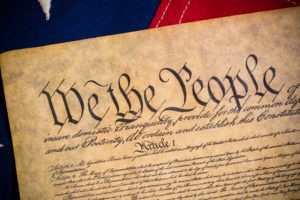I believe there is one quality that makes America a great and enduring nation.
It is the balance between a strong central government and powerful states’ rights.
Local Government
The best government is government that is closest to the people.
I am a big believer in local determination. My reasons are very personal. I am happiest when I control and work out my own destiny. I have never felt comfortable when people who are far away decide what is best for me. I am fully capable of doing that for myself.
On the other hand, the worst government is local government that creates conscious and subconscious forms of discrimination.
It is troubling when local populations pass laws that hurt people in their own communities. For example “Jim Crow” laws passed by southern, white segregationists from 1876 to 1965, among other things, prohibited blacks from voting.
When people are cut off from the source of their strength, and, in the process, are delegitimized, they rightfully become rebellious. You can’t blame them. Hostility builds in communities. Peace and prosperity break down.
In America that’s when a strong federal government is valuable. It forces local cultures to face their blind spots.
Central Government
In my lifetime, there have been several great acts of political courage, none greater than President Lyndon Johnson’s pressing forward with 1960’s legislation that disrupted Jim Crow laws in housing and education, as well as voting.
In education it was finally determined that separate is not equal in education. Equal is equal. Desegregation of public schools began.
In housing, blacks can live wherever the hell they want to live. That’s now the law of the land.
In voting, well you know that preventing people from voting is a criminal offense. (I saw a little Jim Crowness creeping back into this last election when I was in Cincinnati, Ohio. Lesson? We can never take our eye off the ball.)
They Were Down, Now They’re Up
Johnson was a democrat and the passage of these civil rights bills cost his Democratic Party dearly. The predominately democrat south left the party and joined the Republican Party.
But slowly the Democratic Party has come back. And without serious reform, the Republican Party, that now houses the tea party and the election intimidators, stands to be a permanent minority party. In fact, if this kind of activity continues in the party of Lincoln, it will not win another presidential election in my lifetime. And I have a lot of living left in me.
(Personally, I would prefer to be a republican than a democrat. But under the present conditions, there is no way that’s going to happen.)
Tension
The forces of states’ rights and those of federalism may seem very unbalanced presently with tea party activists disrupting the processes of congress for and in behalf of states’ rights.
But, it is working as designed. In fact the balance of powers has been tested more severely in the past than even what we are witnessing presently. The Revolutionary War and the Civil War are the great and enduring examples.
Each Person Must Be Heard
I believe strongly that in a democracy the air must be cleared on every issue. To do that every voice must be heard. Such is taking place presently re the Affordable Health Care Act.
What decisions will be made is not the point of this article, not withstanding my predictions. That all voices are being heard as a result of building a strong balance between the power of a federal government and strong states’ rights is.
